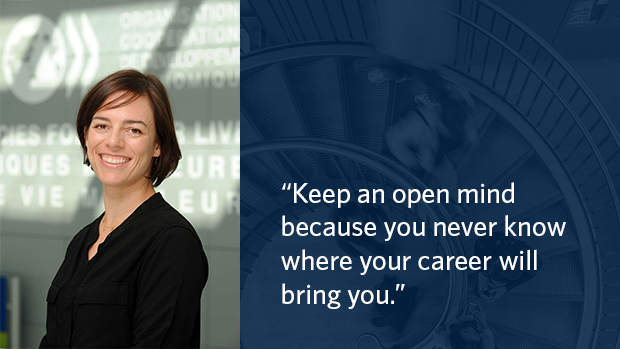

Julie Bélanger
Combining her research skills with a passion for education, alumna Julie Bélanger is working to improve the frameworks of educational systems on an international level.
Bélanger received her MA and PhD in Developmental Psychology from UBC in 2006. After graduating, Bélanger continued her pursuit in the area of research. She worked as an analyst at the Organisation for Economic Co-operation and Development (OECD), and as a senior researcher at the Canadian Council on Learning. These experiences sparked her interest in educational issues and ultimately led her to become a research leader at RAND Europe.
RAND is a non-profit research organization focused on enhancing communities worldwide by designing solutions to public policy challenges. Bélanger’s current work with RAND Europe focuses on the fields of education and social policy. In this role, she provides leadership for research projects ranging from early childhood education and care to higher education.
In 2017, Bélanger developed a commentary piece “Why a Lack of STEM Teachers Could Jeopardise the Canada 2067 Vision” that parallels the challenges found in England’s STEM teaching workforce with Canada’s STEM education approaches. This commentary was featured in Canada 2067, a national initiative to shape the future of STEM in the student education system.
In this Q&A, Bélanger shares and reflects on her journey from studying psychology to working for an international research organization.
WHERE AND WHAT IS YOUR CURRENT POSITION?
IS YOUR CURRENT CAREER PATH AS YOU ORIGINALLY INTENDED?
HOW DOES THIS JOB RELATE TO YOUR GRADUATE DEGREE?
WHAT MOTIVATED YOU TO PURSUE GRADUATE WORK AT UBC?
WHAT DID YOU ENJOY THE MOST ABOUT YOUR TIME AS A GRADUATE STUDENT AT UBC?
WHAT ARE KEY THINGS YOU DID THAT CONTRIBUTED TO YOUR SUCCESS?
WHAT IS YOUR BEST PIECE OF ADVICE FOR CURRENT GRADUATE STUDENTS PREPARING FOR THEIR FUTURE CAREERS?
HOW DID YOU FIND OUT ABOUT/OBTAIN YOUR CURRENT POSITION?
WHAT CHALLENGES DID YOU FACE IN YOUR GRADUATE DEGREE, OR IN LAUNCHING YOUR CAREER?
HOW ARE JOBS NORMALLY POSTED AND FILLED IN YOUR ORGANIZATION OR INDUSTRY?
WHAT DO YOU LIKE AND WHAT DO YOU FIND CHALLENGING ABOUT YOUR CURRENT POSITION?
Learn more about Julie Bélanger’s work at Rand Corporation or get in touch with Julie on LinkedIn.
This story was originally published on the UBC Graduate School website.


